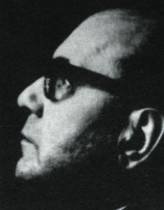
Hans Swarowsky (16.09.1899, Budapest, Hungary - 10.09.1975, Salzburg, Austria) Hans Swarowsky was celebrated as both a conductor and as a teacher. He studied composition in Vienna with Arnold Schoenberg and Anton Webern and conducting with Richard Strauss, Felix Weingartner and Clemens Krauss. Hans Swarowsky held positions in Stuttgart, Gera, Hamburg (1932), Berlin (1934), Zürich (1937-1940), Krakow (1944-1946), Graz (1947-1950) and at the Vienna State Opera (1957). He was chief conductor of the Royal Scottish National Orchestra, from 1957 to 1959. From 1959 he was chief conductor of Vienna Symphony Orchestra, and appeared also as guest conductor of the Vienna State Opera. Perhaps Hans Swarowsky's fame rests most with his reputation as a teacher. For many years Professor Swarowsky held master classes in conducting at the Academy of Music and Performing Arts in Vienna, where he was head of conducting from 1946. Famous students of Swarowsky's include Claudio Abbado, Albert Rosen, Jesús López-Cobos, Bruno Weil, Mariss Jansons, Giuseppe Sinopoli and Zubin Mehta. Many aspiring young conductors compete in the Hans Swarowsky International Conductors Competition, held in Vienna. Hans Swarowsky made many recordings with the Vienna Symphony Orchestra and the Vienna State Opera Orchestra. His recordings appear on the Supraphon, Concert Hall, Nonesuch, Erato, Preiser, Vox and Vanguard labels. He recorded a complete Der Ring des Nibelungen with the Prague National Theatre Orchestra.
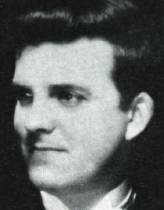 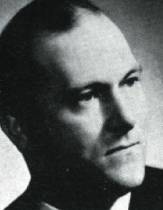
Kieth Engen Kurt Equiluz 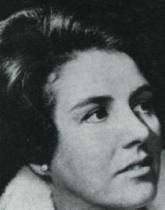 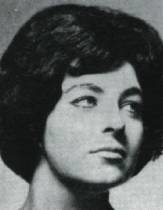
Heather Harper Ruth Hesse 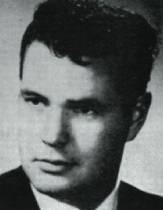
Thomas Page (?) 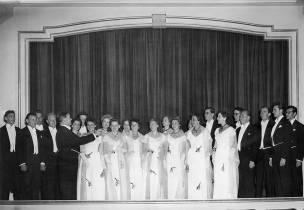
Wiener Akademie Kammerchor means having a solid foundation: ever since the choir was founded in 1947, it has been building a strong musical tradition. But Wiener Kammerchor also means rising to a challenging occasion: with works that others would turn down just upon hearing the name (for example, Anders Hillborg’s ‘muóodeyiyouosum’, which not even the computer is able to write correctly). Wiener Kammerchor means being prepared to take risks: it takes giving one’s all to achieve musical perfection and precision in both rehearsals and performances. But Wiener Kammerchor also means winning: prizes at prestigious competitions such as the finale of the European Broadcasting Union (EBU) contest in 1999. Wiener Kammerchor means having a fixed place on the Austrian cultural scene: whether at ‘Wien Modern’, the ‘Brucknerfest’ in Linz or ‘Klangbogen’, the ensemble is at home at many festivals. But Wiener Kammerchor also means being away from home: touring from Japan to Greece and from Hong Kong to Spain. Wiener Kammerchor means being on familiar terms with great artists: such as Paul Hindemith, who once proudly announced, ‘I’ve written a mass for you!’ But Wiener Kammerchor also means taking an interest in small treasures: these vocalists are constantly discovering the kind of gems that make your eyes (and ears) pop out of your head. Wiener Kammerchor means being the experienced partner of great orchestras: Il Giardino Armonico and the Vienna Symphony demand total commitment. But Wiener Kammerchor also means not taking everything with deadly seriousness: things start swinging when these seasoned veterans and young warriors give free rein to their thirst for experimentation. Wiener Kammerchor means keeping a cool head in even the most difficult situation: it is a quality that is appreciated by star conductors such as Thomas Hengelbrock and Georges Prêtre. But Wiener Kammerchor also means burning with inward fire: and giving performances that send showers of sparks across the audience. The Wiener Kammerchor sings works from the Renaissance to the present.
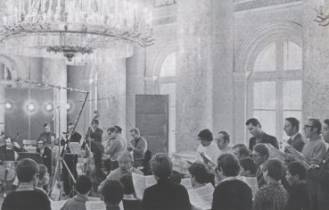
Wiener Sängerknaben. In 1498, half a millenium ago, Emperor Maximilian I moved his court and his court musicians from Innsbruck to Vienna. He gave specific instructions that there were to be six boys among his musicians. For want of a foundation charter, historians have settled on 1498 as the official foundation date of the Vienna Hofmusikkapelle and the Vienna Choir Boys. The choir sang exclusively for the court, at mass, at private concerts and on state occasions. Musicians like Heinrich Isaac, Paul Hofhaimer, Heinrich Ignaz Franz Biber, Christoph Willibald Gluck, Wolfgang Amadeus Mozart, Antonio Caldara, Antonio Salieri and Anton Bruckner worked with the choir. Some were choristers themselves, such as composers Jacobus Gallus, Franz Schubert, and - as substitutes - the brothers Franz Joseph and Michael Haydn, and the conductors Hans Richter, Felix Mottl and Clemens Krauss. In 1918, after the breakdown of the Habsburg empire, the Austrian government took over the court opera (i.e. the orchestra and the adult singers), but not the choir boys. The Wiener Sängerknaben owe their survival to the initiative and business acumen of Josef Schnitt, who became dean of the imperial chapel in 1921. Today there are 95 choristers between the ages of ten and fourteen, divided into four touring choirs. During their tours, the boys visit virtually all European countries, and they are frequent guests in Asia, Australia and the Americas. They visit the USA and Canada almost every year. Every Sunday, with the exception of the summer vacations, the choir sings at Mass in the Imperial Chapel, as they have done since 1498. The choir’s artistic director is Gerald Wirth. Norbert Balatsch, the long-serving chorus master of the Bayreuth Festival and the Vienna State Opera, is available for advice. Their repertoire spans five centuries of music, it includes Renaissance as well as contemporary music. Benjamin Britten, as well as Austrian composers Heinz Kratochwil, Ernst Krenek and Anton Heiller have written works for the Wiener Sängerknaben. Britten wrote the vaudeville The Golden Vanity for them, and even conducted its premiere at the Aldeburgh Festival in 1967. They toured China, Japan and Germany with a children's opera by Gerald Wirth, based on Antoine de Saint-Exupéry’s The Little Prince. Wirth is currently writing a new opera for the choir. In addition to their own tours and projects, the boys sing a number of concerts each season with men’s chorus and orchestra, both in Vienna and abroad. This season, the boys sang Mozart’s Coronation Mass in St. Peter’s in the Vatican, conducted by Riccardo Muti. The choir is regularly asked to supply soloists for large choral and orchestral works, such as Britten's Chichester Psalms, Gustav Mahler's Das Klagende Lied or Mozart's Die Zauberflöte. The Wiener Sängerknaben have their own school. Almost 250 children live, study and rehearse in the Augartenpalais, a baroque palace in Vienna. Beginning with kindergarten, the children (boys and girls) are provided with a complete musical and general education through the elementary grades. At age ten, the most talented boys are selected to join the choir and enter the choir’s grammar school. All boys are assigned to one of the touring choirs. Academic lessons are taught in small groups of no more than 15 children. The school has a band, and offers extracurricular activities ranging from sports (baseball, judo, soccer, rollerblading, swimming) to attending (pop) concerts, operas, plays, musicals and movies. The choristers are also encouraged to create their own projects; a number of them write, act and direct short sketches about life at the school. The school is proud of its alumni, many of whom go on to become professional musicians, conductors, singers or instrumentalists, in Vienna and throughout the world. Many others continue to sing; there are two male voice ensembles made up entirely of former Vienna Choir Boys, the Chorus Viennensis and the Imperial Chapel’s Schola Cantorum. All former students retain a lifelong commitment to the arts.
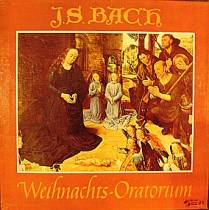
Christmas Oratorio (German: Weihnachtsoratorium) BWV 248, is an oratorio by Johann Sebastian Bach intended for performance in church during the Christmas season. It was written for the Christmas season of 1734 incorporating music from earlier compositions, including three secular cantatas written during 1733 and 1734 and a now lost church cantata, BWV 248a. The date is confirmed in Bach's autograph manuscript. The next performance was not until 17 December 1857 by the Sing-Akademie zu Berlin under Eduard Grell. The Christmas Oratorio is a particularly sophisticated example of parody music. The author of the text is unknown, although a likely collaborator was Christian Friedrich Henrici (Picander). The work belongs to a group of three oratorios written towards the end of Bach's career in 1734 and 1735 for major feasts, the others being the Ascension Oratorio (BWV 11) and the Easter Oratorio (BWV 249). All include a tenor Evangelist as narrator and parody earlier compositions, although the Christmas Oratorio is by far the longest and most complex work. The oratorio is in six parts, each part being intended for performance on one of the major feast days of the Christmas period. The piece is often presented as a whole or split into two equal parts. The total running time for the entire work is nearly three hours. The first part (for Christmas Day) describes the Birth of Jesus, the second (for December 26) the annunciation to the shepherds, the third (for December 27) the adoration of the shepherds, the fourth (for New Year's Day) the circumcision and naming of Jesus, the fifth (for the first Sunday after New Year) the journey of the Magi, and the sixth (for Epiphany) the adoration of the Magi.
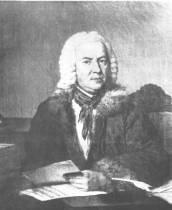
Johann Sebastian Bach Christmas Oratorio, BWV 248 Part I: For the First Day of Christmas
Part II: For the Second Day of Christmas Part III: For the Third Day of Christmas Part IV: For New Year's Day Part V: For the First Sunday in the New Year Part VI: For the Feast of Epiphany Kieth Engen, bass Kurt Equiluz, tenor Thomas Page, tenor Heather Harper, soprano Ruth Hesse, mezzo-soprano Wiener Sängerknaben Wiener Akademie Kammerchor Vienna State Symphony Orchestra Hans Swarowsky 1968 |

